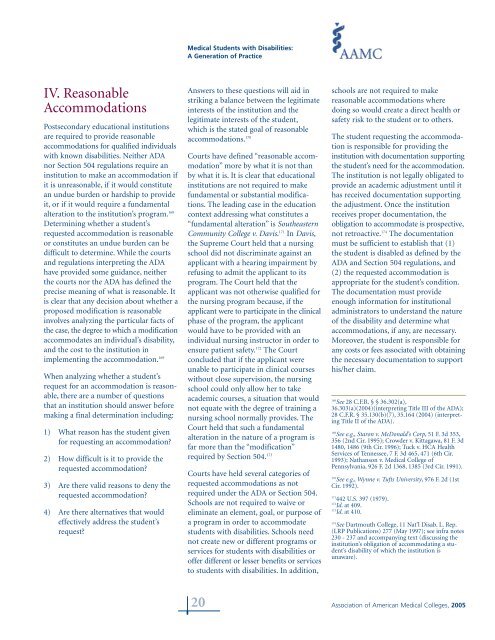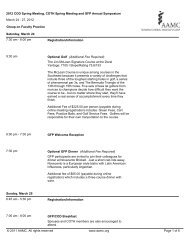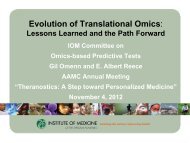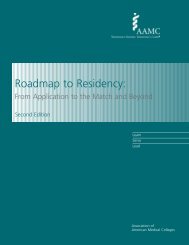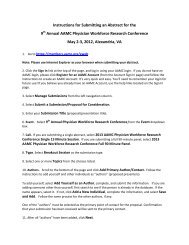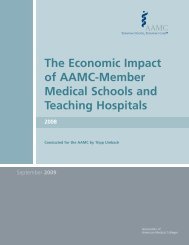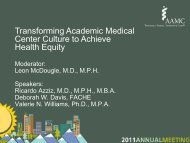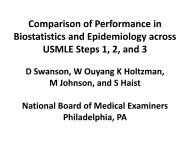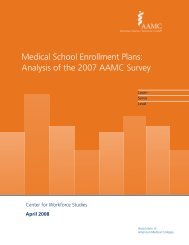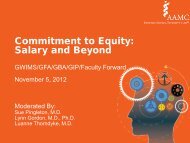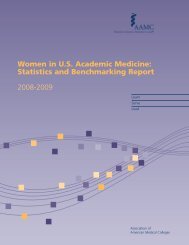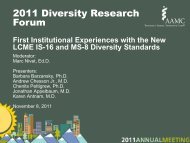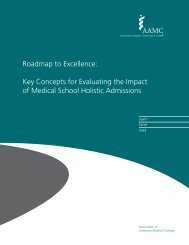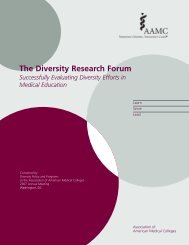Medical Students with Disabilities: A Generation of Practice
Medical Students with Disabilities: A Generation of Practice
Medical Students with Disabilities: A Generation of Practice
You also want an ePaper? Increase the reach of your titles
YUMPU automatically turns print PDFs into web optimized ePapers that Google loves.
<strong>Medical</strong> <strong>Students</strong> <strong>with</strong> <strong>Disabilities</strong>:<br />
A <strong>Generation</strong> <strong>of</strong> <strong>Practice</strong><br />
IV. Reasonable<br />
Accommodations<br />
Postsecondary educational institutions<br />
are required to provide reasonable<br />
accommodations for qualified individuals<br />
<strong>with</strong> known disabilities. Neither ADA<br />
nor Section 504 regulations require an<br />
institution to make an accommodation if<br />
it is unreasonable, if it would constitute<br />
an undue burden or hardship to provide<br />
it, or if it would require a fundamental<br />
alteration to the institution’s program. 168<br />
Determining whether a student’s<br />
requested accommodation is reasonable<br />
or constitutes an undue burden can be<br />
difficult to determine. While the courts<br />
and regulations interpreting the ADA<br />
have provided some guidance, neither<br />
the courts nor the ADA has defined the<br />
precise meaning <strong>of</strong> what is reasonable. It<br />
is clear that any decision about whether a<br />
proposed modification is reasonable<br />
involves analyzing the particular facts <strong>of</strong><br />
the case, the degree to which a modification<br />
accommodates an individual’s disability,<br />
and the cost to the institution in<br />
implementing the accommodation. 169<br />
When analyzing whether a student’s<br />
request for an accommodation is reasonable,<br />
there are a number <strong>of</strong> questions<br />
that an institution should answer before<br />
making a final determination including:<br />
1) What reason has the student given<br />
for requesting an accommodation?<br />
2) How difficult is it to provide the<br />
requested accommodation?<br />
3) Are there valid reasons to deny the<br />
requested accommodation?<br />
4) Are there alternatives that would<br />
effectively address the student’s<br />
request?<br />
Answers to these questions will aid in<br />
striking a balance between the legitimate<br />
interests <strong>of</strong> the institution and the<br />
legitimate interests <strong>of</strong> the student,<br />
which is the stated goal <strong>of</strong> reasonable<br />
accommodations. 170<br />
Courts have defined “reasonable accommodation”<br />
more by what it is not than<br />
by what it is. It is clear that educational<br />
institutions are not required to make<br />
fundamental or substantial modifications.<br />
The leading case in the education<br />
context addressing what constitutes a<br />
“fundamental alteration” is Southeastern<br />
Community College v. Davis. 171 In Davis,<br />
the Supreme Court held that a nursing<br />
school did not discriminate against an<br />
applicant <strong>with</strong> a hearing impairment by<br />
refusing to admit the applicant to its<br />
program. The Court held that the<br />
applicant was not otherwise qualified for<br />
the nursing program because, if the<br />
applicant were to participate in the clinical<br />
phase <strong>of</strong> the program, the applicant<br />
would have to be provided <strong>with</strong> an<br />
individual nursing instructor in order to<br />
ensure patient safety. 172 The Court<br />
concluded that if the applicant were<br />
unable to participate in clinical courses<br />
<strong>with</strong>out close supervision, the nursing<br />
school could only allow her to take<br />
academic courses, a situation that would<br />
not equate <strong>with</strong> the degree <strong>of</strong> training a<br />
nursing school normally provides. The<br />
Court held that such a fundamental<br />
alteration in the nature <strong>of</strong> a program is<br />
far more than the “modification”<br />
required by Section 504. 173<br />
Courts have held several categories <strong>of</strong><br />
requested accommodations as not<br />
required under the ADA or Section 504.<br />
Schools are not required to waive or<br />
eliminate an element, goal, or purpose <strong>of</strong><br />
a program in order to accommodate<br />
students <strong>with</strong> disabilities. Schools need<br />
not create new or different programs or<br />
services for students <strong>with</strong> disabilities or<br />
<strong>of</strong>fer different or lesser benefits or services<br />
to students <strong>with</strong> disabilities. In addition,<br />
schools are not required to make<br />
reasonable accommodations where<br />
doing so would create a direct health or<br />
safety risk to the student or to others.<br />
The student requesting the accommodation<br />
is responsible for providing the<br />
institution <strong>with</strong> documentation supporting<br />
the student’s need for the accommodation.<br />
The institution is not legally obligated to<br />
provide an academic adjustment until it<br />
has received documentation supporting<br />
the adjustment. Once the institution<br />
receives proper documentation, the<br />
obligation to accommodate is prospective,<br />
not retroactive. 174 The documentation<br />
must be sufficient to establish that (1)<br />
the student is disabled as defined by the<br />
ADA and Section 504 regulations, and<br />
(2) the requested accommodation is<br />
appropriate for the student’s condition.<br />
The documentation must provide<br />
enough information for institutional<br />
administrators to understand the nature<br />
<strong>of</strong> the disability and determine what<br />
accommodations, if any, are necessary.<br />
Moreover, the student is responsible for<br />
any costs or fees associated <strong>with</strong> obtaining<br />
the necessary documentation to support<br />
his/her claim.<br />
168<br />
See 28 C.F.R. § § 36.302(a),<br />
36.303(a)(2004)(interpreting Title III <strong>of</strong> the ADA);<br />
28 C.F.R. § 35.130(b)(7), 35.164 (2004) (interpreting<br />
Title II <strong>of</strong> the ADA).<br />
169<br />
See e.g., Staron v. McDonald’s Corp, 51 F. 3d 353,<br />
356 (2nd Cir. 1995); Crowder v. Kittagawa, 81 F. 3d<br />
1480, 1486 (9th Cir. 1996); Tuck v. HCA Health<br />
Services <strong>of</strong> Tennessee, 7 F. 3d 465, 471 (6th Cir.<br />
1993); Nathanson v. <strong>Medical</strong> College <strong>of</strong><br />
Pennsylvania, 926 F. 2d 1368, 1385 (3rd Cir. 1991).<br />
170<br />
See e.g., Wynne v. Tufts University, 976 F. 2d (1st<br />
Cir. 1992).<br />
171<br />
442 U.S. 397 (1979).<br />
172<br />
Id. at 409.<br />
173<br />
Id. at 410.<br />
174<br />
See Dartmouth College, 11 Nat’l Disab. L. Rep.<br />
(LRP Publications) 277 (May 1997); see infra notes<br />
230 - 237 and accompanying text (discussing the<br />
institution’s obligation <strong>of</strong> accommodating a student’s<br />
disability <strong>of</strong> which the institution is<br />
unaware).<br />
20 Association <strong>of</strong> American <strong>Medical</strong> Colleges, 2005


